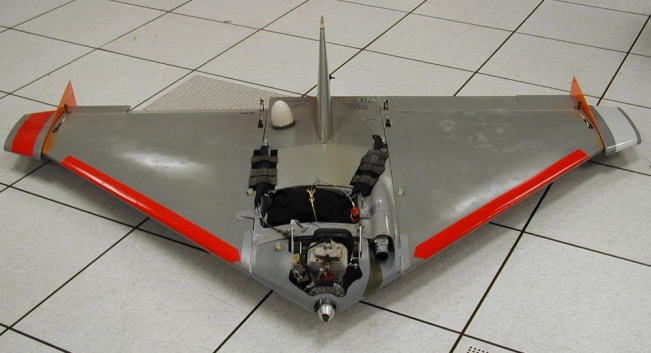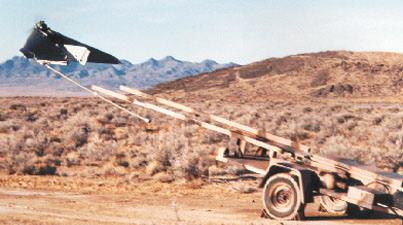BAI Aerosystems BQM-147 Exdrone
The Exdrone is a low-cost multipurpose mini-UAV, which is used by the U.S. Army and U.S. Marine Corps.
The Exdrone was originally developed in the late 1980s by the Applied Physics Laboratory of the Johns Hopkins University as a very low cost expendable communcations jamming drone. As such, the vehicle first flew in 1986. In 1988 the U.S. Army ordered 14 Exdrones from BAI Aerosystems, which were evaluated in early 1989. In August that year, a production contract for the BQM-147A was issued to RPV Industries of Canada, but this contract was cancelled in 1990 because of quality deficiencies in RPV Industries' Exdrones. A full scale production contract for the BQM-147A was finally awarded to BAI, after the U.S. Marines had also issued a requirement for a low-cost portable reconnaissance UAV.
 |
| Photo: U.S. Navy |
| BQM-147A |
The BQM-147A is a small portable pure delta vehicle, which is powered by a single-cylinder two-stroke piston engine. The Exdrone is normally launched from a short rail system, but rocket-assisted near-vertical takeoffs are also possible. It is equipped with a forward/downward looking colour TV camera with tilt/pan/zoom capability, and further payload options include a laser range-finder, IR camera, jammers and communications relay equipment. There is also the option to use an auxiliary fuel tank, to increase range from 120 km (65 nm) to 360 km (195 nm). The UAV is controlled from the ground with a radio-command uplink and a real-time video downlink. The Exdrone can also be programmed before or during the flight for automatic completion of the mission. The autopilot has a GPS receiver for high-precision navigation. The BQM-147A can either land on its skids, or be caught in a recovery net.
 |
| Photo: U.S. Army |
| BQM-147A |
The Exdrone was used operationally in Operation Desert Storm in 1991 for daytime surveillance of Iraqi barriers and minefields. In 1998, the USMC converted about 40 BQM-147As to Dragon Drone configuration. These feature numerous improvements, including a new autopilot unit, improved sensors, and many additional payload options. More than 400 Exdrones have been built for the U.S. armed forces so far.
Specifications
Note: Data given by several sources show slight variations. Figures given below may therefore be inaccurate!
Data for BQM-147A:
| Length | 1.62 m (5 ft 3.6 in) |
| Wingspan | 2.50 m (8 ft 2.4 in) |
| Height | 0.49 m (1 ft 7.2 in) |
| Weight | 41 kg (91 lb) |
| Speed | 185 km/h (100 knots); loiter speed 120 km/h (65 knots) |
| Ceiling | 3000 m (10000 ft) |
| Range | 120 km (65 nm) |
| Endurance | 2.5 hours |
| Propulsion | Quadra 100SS 100cc single-cylinder two-stroke piston engine; 6.3 kW (8.5 hp) |
Main Sources
[1] Kenneth Munson (ed.): "Jane's Unmanned Aerial Vehicles and Targets, Issue 15", Jane's, 2000
[2] Kenneth Munson: "World Unmanned Aircraft", Jane's, 1988
Back to Current Designations Of U.S. Unmanned Military Aerospace Vehicles
Back to Directory of U.S. Military Rockets and Missiles
Last Updated: 10 October 2002